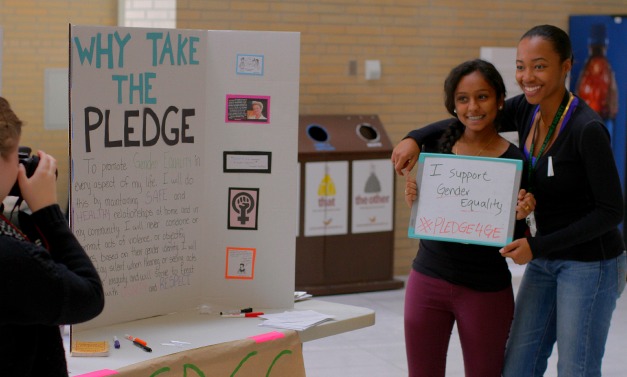Teaching the ABCs of activism

Gerthana Arunan (left) and Crystal Williams (right) encourage students to sign the White Ribbon Campaign pledge for gender equity, part of their activism project for Karen Balcom's first year course,
Each fall, on the first day of class, Karen Balcom shares the story of the Hummingbird with her students.
In the story, a forest fire rages out of control. All the animals watch, immobilized, as the flames spread; all except one little Hummingbird.
Instead, the hummingbird flies back and forth to the river, releasing tiny droplets of water one by one onto the fire. The animals ask, ‘what do you think you can do? You are too little, this fire is too big.”
The Hummingbird replies, “I’m doing the best that I can.”
This is the message Balcom, an associate professor of history and instructor in McMaster’s Gender Studies and Feminist Research program, wants students to take away from her first year Women’s Studies course, “Women Transforming the World.”

The course takes basic feminist theoretical concepts and, working collaboratively with community organizations and campus groups, teaches students how to take action on difficult local and transnational issues.
“In the course we look at what are some really intractable problems and look at what successful activist strategies have been,” says Balcom. “It’s about giving students a basic set of tools. I want them to walk out of this class thinking, I can do something, I can apply the things I’ve learned in a University classroom out there.”
In addition to traditional course readings, Balcom encourages students to read activist literature and first-hand accounts from those affected by gender inequality, go to social justice websites and attend activist events. She also invites activists from a range of local groups like the Grandmothers to Grandmothers campaign and the Sexual Assault Centre of Hamilton (SACHA) to come and talk to the class.
The course also provides students with a unique opportunity to apply what they’ve learned. Instead of writing a traditional research paper, students have the option of completing an activism project.
Balcom works closely with her community partners to generate a list of possible projects using a strict set of criteria.
“We choose projects that will give them a chance to do something real, but not extend beyond what they’re able to prepare for carefully,” says Balcom. “We don’t want them jumping in over their heads or taking something on that they’re not trained for, or prepared for.”
“Also, we want them to explore, but they can’t become burdens on social justice organizations,” adds Balcom. “It’s really important to me that if I’m bringing community partners into this, that we’re really clear about who is going to do what and that it’s going to be beneficial. I’m always checking in and saying are we being a drain? Is this a net benefit to you?
This year about 50 students opted to complete activism projects which ranged from working with on-campus organizations like McMaster-Community Poverty Initiative and the MSU Women’s and Gender Equity Network, to participating in the Hamilton Feminist Zine Fair and helping with on-campus events for the December 6th National Day of Remembrance and Action on Violence Against Women.
Crystal Williams, a fourth year life sciences student, worked on a project from the White Ribbon Campaign, where the students developed and promoted a pledge for gender equity. Williams describes the experience as “eye-opening.”
“I never thought I would be part of a project like this- it’s really changed my perspective,” says Williams, “I’ve learned that being involved isn’t necessarily about going out and protesting with a cardboard sign. It could be as simple as a tweet to help raise awareness, donating your time or money, or becoming an activist locally in your own community- it’s really just about getting involved.”
Balcom has been offering experiential learning opportunities to students for a number of years, but credits a Forward with Integrity grant with helping her to design the course more effectively.
“I used the funds to hire graduate students from Gender Studies and Feminist Research to do a literature review on teaching for activism and a content analysis of what students had to say about their experiences. I’ve worked very closely with PhD student Julie Gouweloos to think through the goals, the pros and cons, and to stake stock of where we are in the course. The course as it works now is the result of the FWI funding.”
Balcom says she hopes after taking the course students will feel empowered to become more deeply involved in activism.
“Where they go after they walk out of my classroom at the end of term one, I don’t always know, but I feel that they’ve been given a push in, what I consider to be, the right direction. What I want to do is to give them the tools so, if they choose, they can do something more ambitious later and be well prepared for it.”

